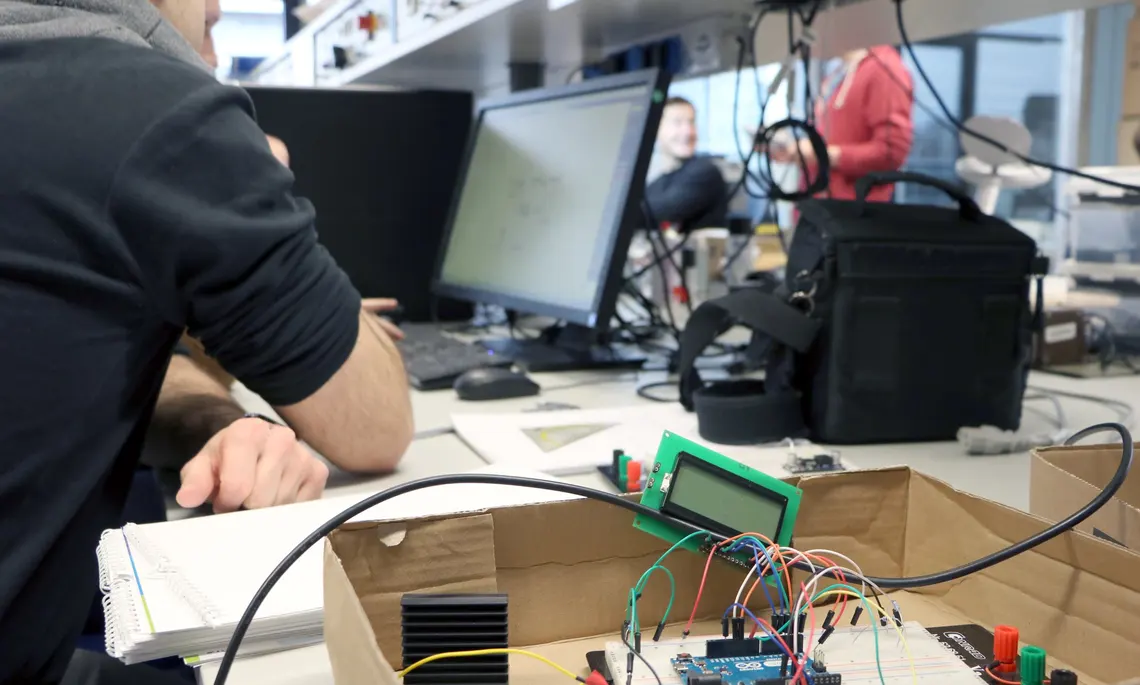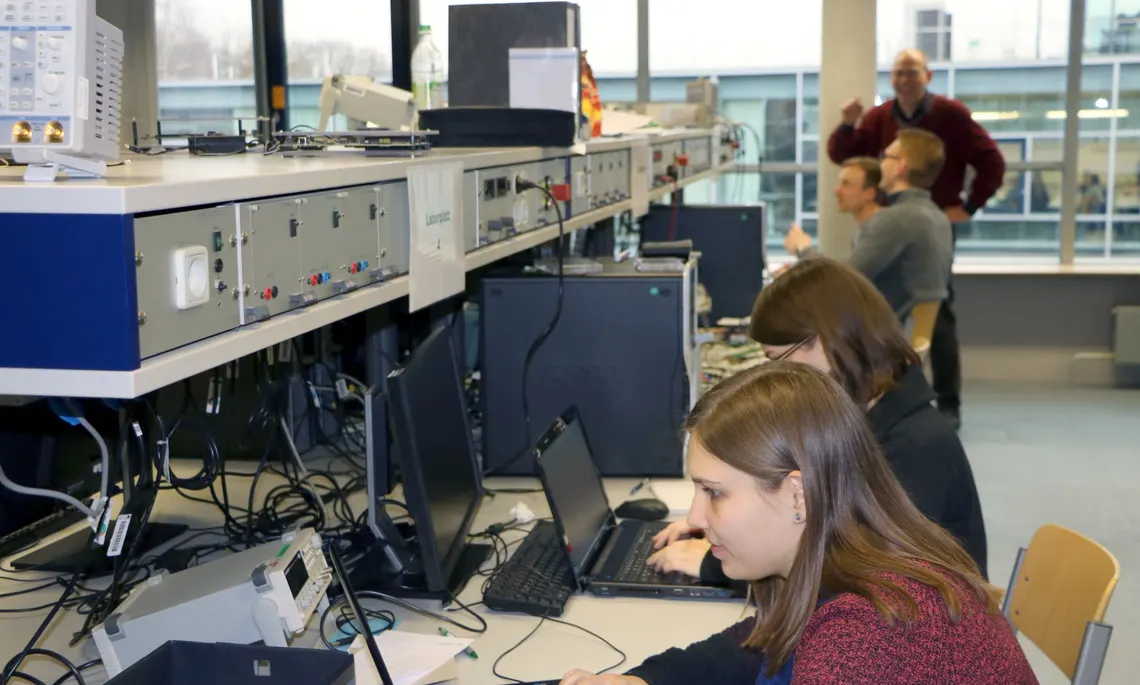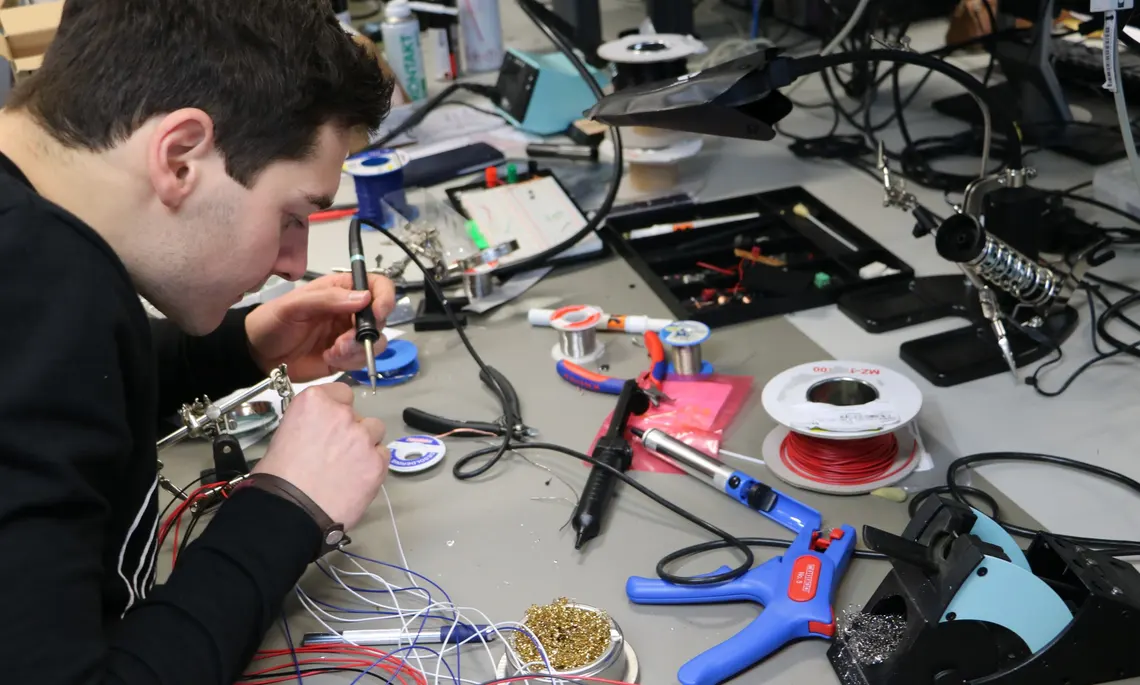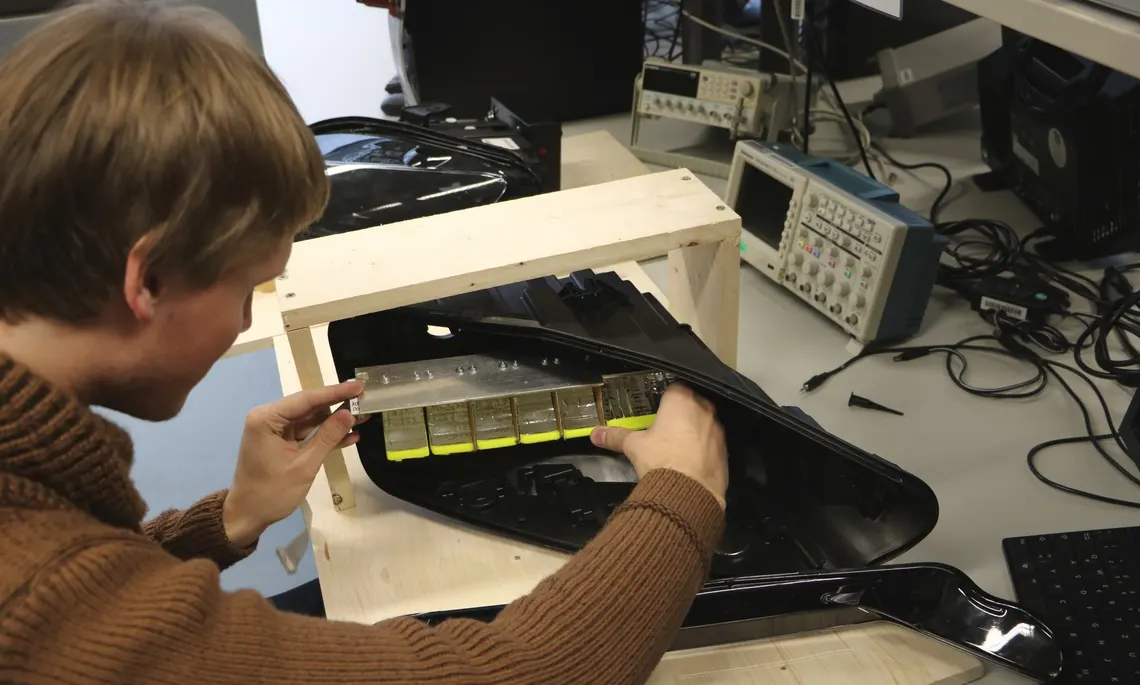The primary task of the laboratory is the practical teaching of students of the study courses Electrical and Information Technology, Mechatronics and Aircraft Computer Science in the field of digital signal processing. For this purpose, the theoretical contents taught in the lectures are put into practice and deepened through practical trainings and project work. Furthermore, numerous student projects are carried out in the field of optoelectronics and lighting technology. Especially in the context of research projects (SmartLed, ZuKo), final theses (Bachelor/Master) are offered.
Goals and idea
The Laboratory of Digital Signal Processing and Optoelectronics is a teaching and research laboratory with the aim of connecting students and supervising lecturers. The resulting connection between teaching and research enables the integration of existing and current industrial knowledge into teaching.
The main focus of the laboratory's training is in the following areas:
- Simulation: Implementation and investigation of algorithms and methods of signal processing on development environments for scientific and technical calculations (e.g. Scilab, Matlab)
- Signal Processors: Implementation of filter algorithms on common signal processor environments. Available are e.g.
- TMS320C6713 DSP Starter Kit (DSK), 225 MHz Floating-Point DSP
- TMS320C6416 DSP Starter Kit (DSK), 600 MHz Fixed-Point DSP - FPGA
- Xilinx Virtex-II Development Kit
- Xilinx Spartan-3E XC3S500E FPGA - Optoelectronics / LED
- Driver electronics for LED headlights
- Transient Thermal Analysis
- Thermal management and reliability
- Thermal simulations
Laboratory equipment and activities
The laboratory equipment includes 11 fully equipped workstations for practical trainings, project studies, other student projects and serves the existing Bachelor & Master further education programs.
The following work is possible at these workstations:
- Development of DSP programs
- Programming of FPGA devices
- Implementation of simulations
- Development, simulation and layout design of electronic circuits
- Performing measurements in electronic circuits
Equipment:
Part of the standard equipment of a measuring station:
- PC with software for DSP and FPGA programming, circuit simulation, layout design and mathematical simulation
- Digital 4 channel storage oscilloscope, multimeter
- Signal generator, measuring amplifier, laboratory power supplies
The area of research / theses includes
- Spectrometer
- Transient Thermal LED Tester
- Modulation transfer function (MTF test bench, ordering phase)
[Translate to English:]
- Software für DSP- und FPGA-Programmierung
- Matlab / Scilab
- LTSpice / PSpice
- Target 3001
- Ansys EM
- SolidWorks / FlowEFD (Leistungsfähiger Simulationsrechner für FE/CFD)
[Translate to English:] Im Labor findet das Praktikum für die Digitale Signalverarbeitung statt hierfür stehen Im Labor ausreichende Arbeitsplätze für Studierende zur Verfügung. Außerdem findet im Rahmen der Leistungselektronik der Versuch „LED-Aufwärtswandler“ statt. Im Winter- wie im Sommersemester werden regelmäßig Studentenprojekte für Studiengänge der Fakultät für Elektrotechnik und Informatik durchgeführt. Dabei werden verschiedenste Fragestellungen aus dem Themengebiet der Optoelektronik und Digitalen Signalverarbeitung bearbeitet. Abschlussarbeiten werden während der Semester im Labor und u.a. zu den Themengebieten Optoelektronik / Thermisches Management von LED Modulen (Simulation und Messtechnik) / Digitalen Signalverarbeitung betreut und absolviert.
Mögliche Lehrveranstaltungen
Lehrveranstaltungen im Bereich der Optoelektronik sind künftig geplant.
[Translate to English:] Im Bereich Optoelektronik/ LED laufen Forschungsprojekte. Die Projekte haben jeweils Arbeitspakete, die im Bereich Optoelektronik/Optik und im Bereich Aufbau und Verbindungstechnik (siehe Labor Aufbau und Verbindungstechnik) liegen.
- SmartLED: Entwicklung eines miniaturisierten Modules für adaptive Scheinwerfer, Messmethodenentwicklung für Zuverlässigkeit und Lebendsauervorhersagen der LED Module, Analyse von Treiberarchiterkturen; Industrielle Partner: Lumileds, Heraeus
- ZuKo: Prozessentwicklung für die elektrische und mechanische Kontaktierung von Bauteilen der Leistungselektronik (Löten und Sintern) und Entwicklung von nicht-zerstörender Messtechnik für die Analyse der Qualität und Zuverlässigkeit der Kontakte; Industrielle Partner: OSRAM, BMW
- Visi0n: Fehleranalyse von Fertigungsprozessen, Fehleranalyse und Testmethodenentwicklung für komplexe elektronische Module (Fahrerassistenzsysteme, insbesondere Kameramodule ); Industrielle Partner: Continental, Anylink
Laboratory management and team
Prof. Dr. Gordon Elger
Phone: +49 841 9348-2840
Room: A114
E-Mail: Gordon.Elger@thi.de
Prof. Dr.-Ing. Michael Botsch
Phone: +49 841 9348-2721
Room: K209
E-Mail: Michael.Botsch@thi.de
Phone: +49 841 9348-3370
Room: C306
E-Mail: Olaf.Imhaeuser@thi.de









![[Translate to English:] Logo Akkreditierungsrat: Systemakkreditiert](/fileadmin/_processed_/2/8/csm_AR-Siegel_Systemakkreditierung_bc4ea3377d.webp)








![[Translate to English:] Logo IHK Ausbildungsbetrieb 2023](/fileadmin/_processed_/6/0/csm_IHK_Ausbildungsbetrieb_digital_2023_6850f47537.webp)


